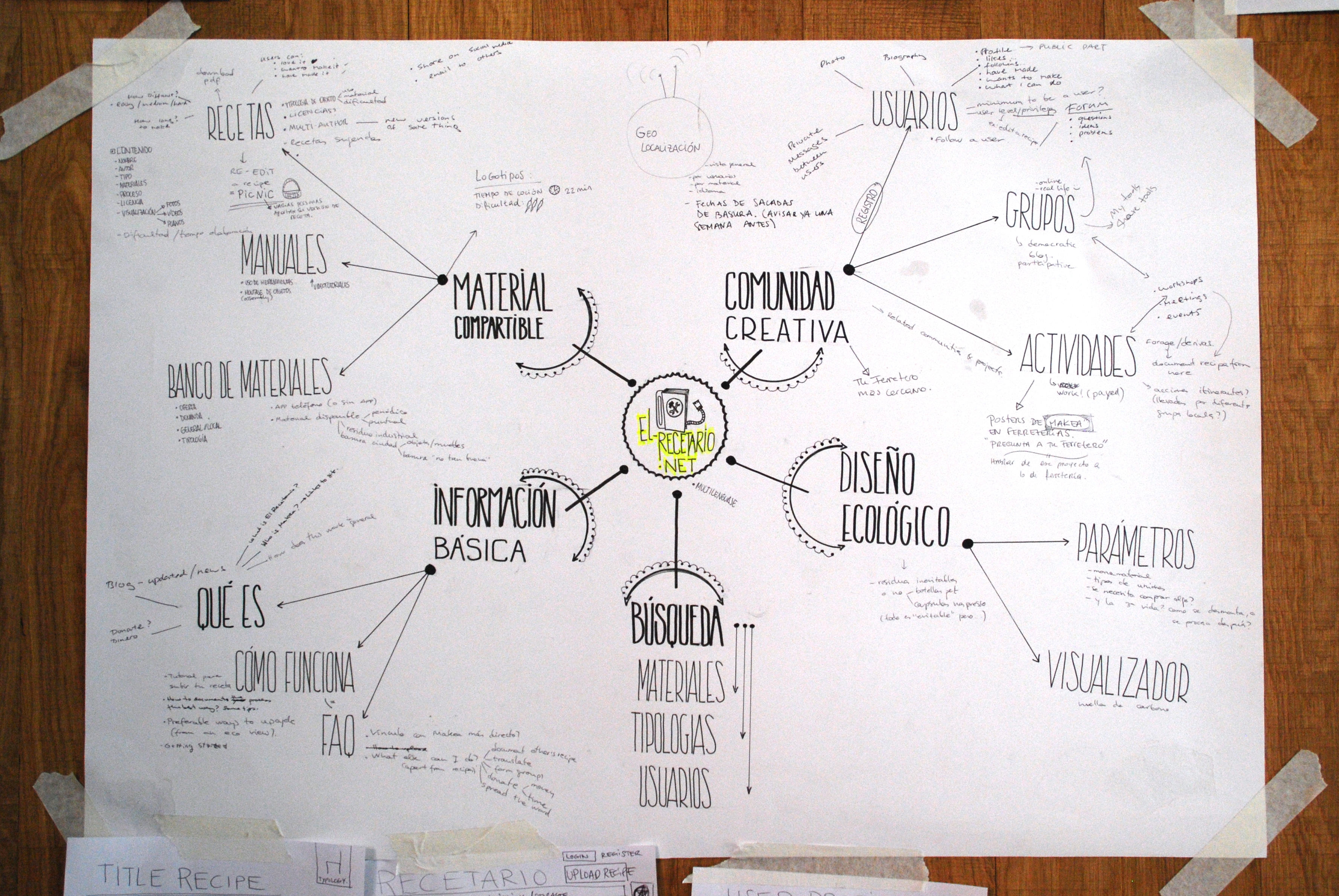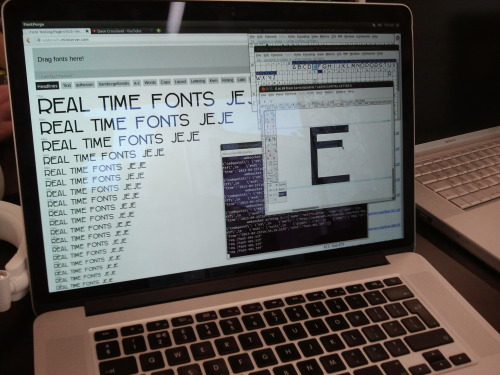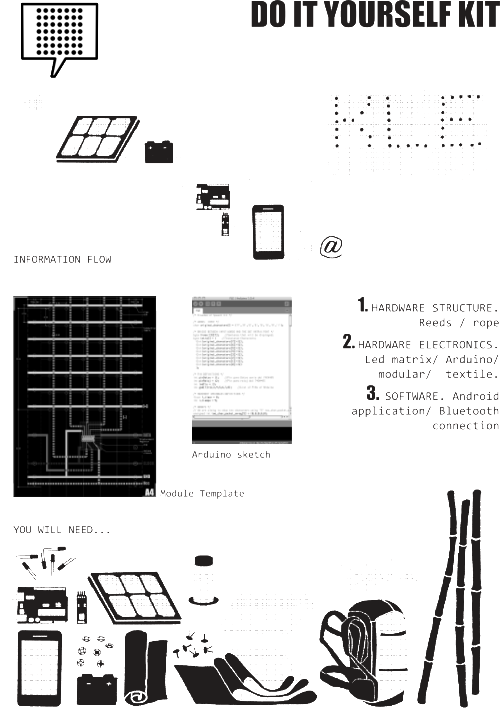Prototype Showcase. Interactivos?'13: Tools for a Read-Write World

Featured projects
- Real Time Collaboration with FontForge
- Design with Git
- Kit de libertad de expresión (KLE)
- Yes, No? Maybe
- Incoma
- El Recetario
- Open Source Digital Pattern Making
- Colaboratorio de relatos
- GRAPA
Approach to the workshop
Designers, illustrators and other artists depend on digital tools. They operate on bits and bytes that can be potentially viewed, copied or published instantaneously and without loss. Practices have become networked and distributed, challenging conventional ideas about who might call herself a specialist and what counts as a professional job. Relations between users and producers have radically changed, at least in theory. In a Read-Write world, any user has permission to view or make changes to files, has the ability to link materials, learn from them and break them.
We present a series of projects which have been collaboratively developed during a two week workshop held in Madrid from April 15-27, 2013. The workshop is a collective platform for research, production, and learning. The work has been carried out in multidisciplinary groups comprised of project leaders and interested collaborators. A team of advisors provides conceptual and technical advice.
Real Time COllaboration with FontForge
by Ben Martin (Brisbane, Australia).Collaborators: Dave Crossland, Øyvind Kolås, Simon Egli, Alexei Vanyashin, Julien Deswaef and Edu Merchán

This project extends the new real time font collaboration feature of FontForge to the web, and opens a discussion with type designers, technical writers, and programmers about where libre font collaboration should go in the future.
FontForge is a libre font editor, available under the GNU GPL v3 or later. Like a multiplayer network game, a user can now run FontForge as a 'host' and other users can connect to them and edit the same font at the same time. When any user edits a glyph, their modifications are sent to all the other collaborating users' copies.
by Julien Deswaef (Brussels, Belgium). Collaborators: Øyvind Pippin Kolås, Capo lorea.org, Edu Merchán, Dave Crossland and Ed Tewiah.
Design with Git is a visualizer of the commit history of SVG files. It's meant to improve collaboration between designers, encourage the use of distributed version control systems, and change, improve or push the designer's workflow into unknown territories.
Git is a distributed version control system that is widely used by programmers. It has improved their collaboration and efficiencies and it has fostered code sharing among programmers. I'm expecting similar results if Git-based collaboration tools are used by graphic designers. Design with Git will be, at its core, a timeline showing the changes of a specific file. In that timeline, when you select two moments, they can be compared visually. It offers a variety of diffs, including side-by-side comparison and visual blending of two versions, showing areas of difference.
by José María Blanco, María Solé Bravo and Anna Carreras (Madrid, Spain). Collaborators: Gonzalo Iglesias Vilachan, Rafael Fernandes de Carvalho, Carlos Fernández Martín, Daniel Alonso Fernández, Sonia Ricketts, Andrea Rosales, Soraya Nasser, Echedey Lorenzo, Miguel, Eva and Carmen

Freedom of Speech Kit is an interactive and portable digital banner that displays messages sent via internet to empower citizens by freedom of speech. We aim at creating a personal digital device that encourages citizens to express freely in public space. It is envisaged initially for demonstrations but since it is a visual platform it has many other uses, such artistic performances and visual arts.
To sum up, we are building a visual connected physical platform that fosters true self expression on the public space so messages can be taken wherever they need to be seen. The future will be democratic or it won’t be.
by Eleanor Greenhalgh (Rotterdam, Holland). Collaborators: Matthias Conrady, Valentino Campisi and Phil Richards.

When we create collaborative documents, what does it mean to "consense?"
This project researches how decision-making tools might allow for and records users' ambivalence. Most tools for curating crowdsourced or collaborative content encode politically-loaded assumptions about how we make decisions. We "like," vote up, approve, or blame the texts and designs of others. The "most popular" content wins; the "best" of online content gets printed. But our social decisions are not really so simple. This project draws on emerging feminist theories of how we reach consent -- as a fluid, ongoing and often ambivalent process. "Yes" doesn't always mean "yes." So how can we encode "maybe?"
Our process during Interactivos? involved the design of various voting and decisionmaking systems -- questioning the supposed function of this process. We produced corruptable procedures and abstract data that lead to different incarnations of what could be called "maybe."
by Miguel Arana Catania and Carlos Barragán (Madrid, Spain). Collaborators: Frederic Janssens, Francisco Sanz García and Andreas Vox.

We are witnessing a unique moment in history in which the collective is becoming the major agent of change in our society. However, we see how the current tools we interact with are not able to fully exploit the potential of collective interaction, working only for extremely small collectives or for large groups but implementing far too simplistic actions.
To deal with this, we focused on the collective intelligence and designed an open-source internet platform that serves as a space for thought and discussion, specifically designed to allow massive access and interactions, without it generating the noise and chaos occurring in traditional discussion tools, but real collective thoughts generated from thousands of contributions. Reworded in a simpler way, to solve the problem of "how can many think together?". Whether the tool is used to collectively write a constitution, create a recipe, a graphic design, or to program a new software, depends only on the users who use it. We believe that facing the problem of collaborative work can open the door to endless ramifications in areas we can not yet even imagine.The project required development through a series of phases, from research on collective thought processes, to research and design of massive access and interaction interfaces, to the production of the platform.
by Makeatuvida (Valencia, España). Collaborators: Geoff Broadwar, Sarah Miah, Verónica Pérez Pérez, Massimo Avvisati, Teresa Fajardo, Sergio Galán, Valentino Campisi and Edu Merchán.

El-Recetario.net is a collaborative platform for research and experimentation on the use of waste to construct furniture and accessories, where people can share what they do and how they do it, learning from that and working with others.
The project combines four variables:
1. research on the waste we produce and its possible reuse as raw material for new objects;
2. creating manuals that can evolve and be shared;
3. interaction and collaboration amongst community members;
4. and continuous feedback between the virtual platform and actions in real life.
The proposal for the workshop is the update of the existing platform El-Recetario.net to turn it into an open space that allows collaborative work amongst its users to generate shareable materials that encourage DIY and reuse of waste.
Open Source Digital Pattern Making
by Susan Spencer (Madison, USA). Collaborators: Mario Behling, Carla Boserman, Steve Conklin, Pablo Perez, Hong Phuc Dang, Molly Richardson and David Ruiz López.

In a technology-driven world, access to digital tools which are modifiable and customizable is becoming more and more essential. The Tau Meta Tau Physica project for open source pattern design aims to create a tool which enables designers, patternmakers, and consumers to express ideas, customize products, order individually-sized unique patterns and garments, and enter into creative business relationships.
The beneficiaries of this pattern making design tool are consumers, independent designers and patternmakers, small and regional garment manufacturers and sewists, and other persons and businesses for whom commercially available proprietary design software has been an inappropriate or marginal fit.
by Carla Bosermann (Madrid, Spain). Collaborators: Susana López-Urrutia, Yaiza Cruz Reyes, Carolina Arciniegas, Víctor Vgm (Akaki), Patricia Raijenstein, Adela Vásquez and Verónica Pérez Pérez.

Colaboratorio de relatos is an experiment of collective creation, a reflection about current production dynamics, distribution, cultural acces and the knowledge and values associated with open culture and the commons environment. We create stories, tales, we re invent and remix collective immagination and characters for a collaborative world.
#HackMito: everything is code, everything is language and social practices. We understand the myth as an ethical space, as a flexible form to account for values to decodify the universe of digital culture, returning to the past to construct future possibilities. We think of superheroes, monsters and supervillians with great powers, limits and fragilitie, in a permanent discussion about weather or not they must abide by the law as a a model of conduct, that will allow us to explore our own doubts and searches.
by Enrique César (México DF, México). Collaborators: Daniela Brill, Diego Paonessa, Olatz Otalora, Capo, Lila Pagola, Mónica Sánchez and Zahara Cerezo.

Grapa (Staple) is a space dedicated to promote libre edition and publication. We are mediators between projects and users interested in the topic: we visualize tools, projects and thoughts on the subject; we make documentation and tutorials that make this process easier; we propose new aproaches, audiences and models for the editorial tasks.
We are interested in exploring and building the concept of an Open Publishing Lab, that begun in Medialab-Prado. That is, to create a workgroup focused on the the development and gathering of software, hardware and practices to rethink the printed culture.



 Medialab-Matadero Madrid
Medialab-Matadero Madrid